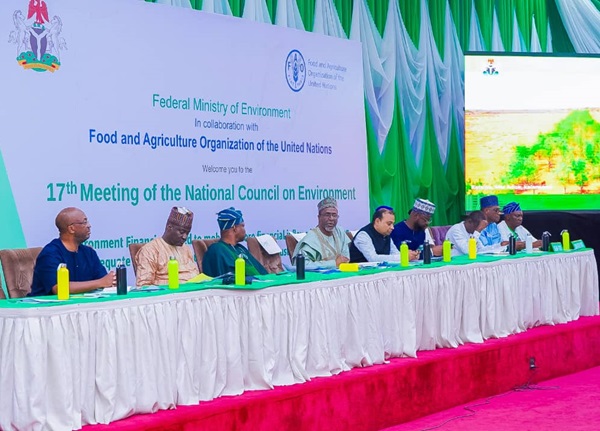
Nigeria has approved a record 50 memoranda out of the 133 received from stakeholders and launched policies to combat climate change, as well as mercury management in the country.
The approved memoranda covered six broad thematic areas, including climate change and renewable energy, drought and desertification, pollution control, flood management, environmental impact assessment and institutional governance.
These approvals were made at the 17th meeting of the National Council on Environment in Abuja, which had 650 participants, including notable dignitaries such as the minister and minister of state for environment, commissioners for environment from the 36 states of the Federation, representatives from the World Bank, FAO and other key stakeholders.
The event was themed “Environment Financing: Need to Mobilise More Financial Flows for Generating Adequate Resources in Support of Environmental Sustainability Efforts.”
The approval of the 50 memoranda marked a significant milestone for actors in the environment sustainability and climate financing space and affirmed that locally initiated efforts are important in combating climate change, pollution, and biodiversity loss.
During the meeting, the council considered several issues raised in the approved memoranda and made salient resolutions, including the development of a National Implementation Strategy for Mercury Management to assist Nigeria in implementing the provisions of the Minamata Convention on Mercury, for which it is a party.
Another resolution reached by the council was the launch of the National Clean Cooking Policy, which mandates all states to embrace cleaner and renewable energy sources such as the adoption of clean cooking stoves, solar energy, and other bio-alternatives for cooking and power generation. The council also encouraged the local production of these renewable energy items.
The council resolved that private finance investment and carbon credit, in addition to budgetary allocation, be sought to mitigate and combat the impacts of climate change leading to competition for environmental resources like clean water and land. The council also addressed environmental scarcity, which has led to farmer-herder conflicts that have resulted in the death of over 20 million Nigerians between 2010 and now.
To address this, the council encouraged the adoption of cleaner and renewable energy sources and the local production of these items. The council recognises that the country has suffered its fair share of environmental scarcity, primarily from the shrinking of Lake Chad, which has led to mass migration of nomadic pastoralists from the Lake Chad region to the southern part of the country occupied by settled farmers, resulting in scarcity of resources.

